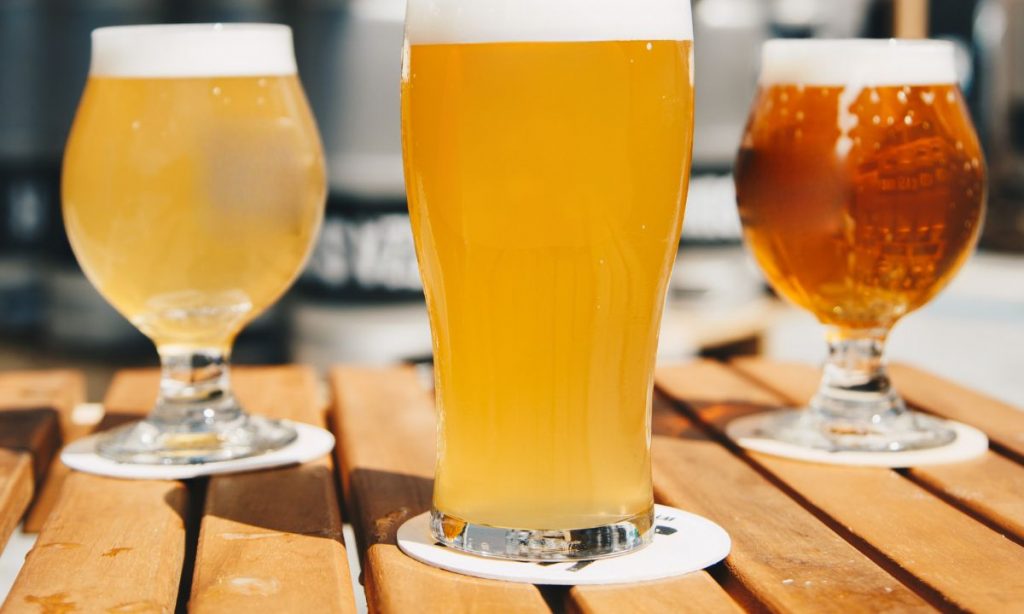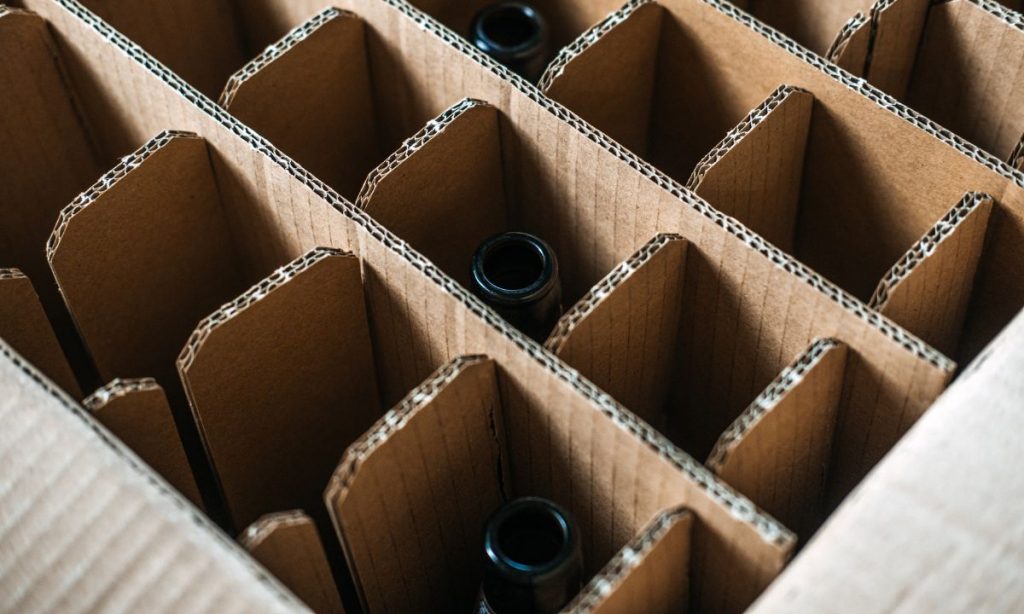Can You Ship Alcohol? Everything You Need to Know About Shipping Beer, Wine, and Liquor
When it comes to shipping alcohol, it’s important to do so safely, in full compliance with regulations, and in a way that protects the packaging and integrity of your products. In this article, we’ll cover the regulations that you should know and provide advice for keeping your packaging intact from shipping origin to destination.
Understanding Legal Requirements for Shipping Alcohol
Navigating the legal requirements for shipping alcohol can feel overwhelming. It’s complex, yes, but understanding these regulations is crucial for any business in the alcoholic beverage industry.
Alcohol Licenses
Before even thinking about boxing up a bottle or can, know this: you need the right licenses. These aren’t one-size-fits-all; they vary from region to region.
In the United States, you’ll need to consider the following:
- Federal Licensing: First off, you’ll need a basic permit issued by the Alcohol and Tobacco Tax and Trade Bureau (TTB) to manufacture, wholesale, or import alcoholic beverages.
- State Licensing: Each state has its own regulations for the sale and shipment of alcohol. You must obtain a license from the alcohol regulatory agency in each state to which you intend to ship. Some states will require a direct shipper’s license while others might require some combination of retail, distributor, and shipping licenses. See a full list of state-by-state alcohol agencies in the U.S.
Because of the complexity and variety of licenses that a manufacturer may need to obtain, many companies exist to help alcohol beverage manufacturers remain compliant, including Sovos, Compliance Service of America, and Avalara, among others.
Wholesale vs. Direct-to-Consumer
When considering shipping alcohol, it’s important to distinguish between shipping to stores, bars, and restaurants (wholesale) and shipments to consumers. Here are some key differentiations to consider:
- Licensing: We covered wholesale licensing considerations above, but when selling direct-to-consumer (DTC), many states require a different shipper’s license and/or permit.
- Age Verification: DTC shipping requires an age verification process to ensure recipients are of legal drinking age.
- Volume Limits: Some states may impose limits on the quantity of alcohol that can be shipped directly to a consumer.
- Labeling and Packaging: When shipping alcohol, there are requirements for labeling and packaging depending on the carrier and the state to which the alcohol is being shipped. We’ll cover this in more detail later in this article.
Alcohol Shipping Agreements
An alcohol shipping agreement is a contract between a distributor or manufacturer of alcohol and a shipping carrier. This agreement outlines the terms under which the carrier will transport products. These agreements typically include the following elements:
- Scope of services: Types of alcohol that will be transported, where will it be picked up and delivered, delivery timelines, etc.
- Compliance agreement: Both parties agree to comply with all applicable federal, state, and local laws regarding shipments of alcohol
- Shipping and packaging requirements: Specifications on how the alcohol must be packaged to minimize damage during transit (including types of materials, labels, and handling instructions)
- Insurance and liability: Details who is responsible for insuring the alcohol during transit, as well as each party’s liability in case of any issues
An alcohol shipping agreement will also commonly include payment terms, provisions for compliance audits and inspections, conditions for termination and renewal, and terms of confidentiality.
Prohibition & Dry Counties
“Prohibition? Wasn’t that repealed a long time ago??” Yes, but believe it or not, certain counties and local jurisdictions may still have strict regulations or may even prohibit the shipment of alcohol. You can view a list of dry counties in the U.S. here.
Beyond county and local laws, certain states impose limits on the amount of alcohol that can be shipped (particularly to consumers) within a given timeframe.
Choosing the Right Packaging & Shipping Materials
Selecting the right packaging materials for shipping alcohol requires a balance between ensuring the safety and integrity of your products, ensuring compliance, and keeping costs in check.
Choosing the Right Containers
You’ll want to consider the individual containers that your products come in as well as the shipping container that will be used to transport your products.
- Glass Bottles and Cans: Ready-to-sell products like glass bottles and aluminum cans are usually packed into cases and then onto pallets. These could be corrugated fiberboard boxes, wooden crates, or cardboard trays wrapped in plastic.
- Barrels and Kegs: Wooden barrels are traditional for spirits like whiskey and wine. Stainless steel kegs are commonly used for beer and cider. Barrels can be wrapped in plastic or another waterproof material to protect against moisture and other elements.
- Bulk Containers: For large quantities beer, wine, or spirits that aren’t bottled or canned, shipping in bulk containers like IBCs (Intermediate Bulk Containers) or Flexitanks is common. These containers can hold thousands of liters of liquid and are designed for easy loading and unloading.
Protecting Alcohol During Shipping
The proper packaging can make all the difference in ensuring your alcoholic beverages reach their destination intact. Consider the following:
- Use Dividers: Keep bottles from knocking into each other by using dividers. These partitions help provide a snug fit, reducing movement and the chance of breakage. These can be corrugated trays, fiber trays, or even plastic trays.
- Proper Sealing Is Key: Don’t skimp on sealing tape. Use a high-quality tape to secure all seams and openings firmly, ensuring that the package remains intact throughout its journey.
- Cushioning Matters: Surround your product with ample cushioning material—bubble wrap, foam inserts, or air pillows work wonders in absorbing shocks and vibrations during transit.
- Check Weight Distribution: Make sure the weight is evenly distributed in each box and container to avoid boxes from becoming top-heavy and tipping over during the shipping process.
Sustainable Packaging Considerations
Sustainable packaging solutions can help support your brand in the eyes of buyers who value environmental stewardship. Materials that can help reduce the environmental impact of packaging and shipping include:
- Corrugated Cardboard
- Biodegradable Packing Peanuts
- Recycled Plastic and Bioplastics
- Paper Bubble Wrap
- Kraft Paper
- Mushroom Packaging
- Seaweed Packaging
- Organic Fabrics
As with any eco-friendly material, you’ll have to weigh the benefit compared to the cost of materials. Consider the entire lifecycle of packaging materials too—from production to usage to disposal.
Labeling Considerations for Shipping Alcohol
When shipping alcohol, two of the major labeling considerations to take into account are the labels on the products inside and the shipping labels themselves.
Protecting Product Labels During Shipping
Whether you’re shipping in cans, bottles, kegs, or larger containers, there’s no doubt about it—alcohol labels must endure the elements during the shipping process. After all, no brewery, winery, or distillery wants to see their products on the shelves with tattered and torn labels.
Here are some tips to ensure your labels endure the shipping process:
- Choose the right high-quality label materials: Your labels are going to have to endure moisture and temperature fluctuations during the shipping process. Choosing label materials that are resistant to scuffing and moisture (for example, BOPP, a synthetic material) will limit damage from the elements.
- Choose the right adhesive: A label printing company like Blue Label can help you choose the right adhesive to withstand temperature fluctuations and humidity.
- Protect your labels: Protective coatings like UV varnishes or lamination can provide an additional barrier against moisture, light exposure, or even damage from friction.
Choosing Alcohol Shipping Labels
You’ll need shipping labels for the boxes, pallets, or containers in which your alcohol is shipped. Obviously these labels will have your business address and the address of the destination, but you’ll also have to follow certain rules and regulations to ensure your shipping labels are compliant:
- Federal Regulations: Your shipping labels must include your permit number and must clearly identify the type of alcohol inside the package (i.e. beer, wine, liquor, etc.). Labels must also include the origin and the destination of the shipment.
- State Regulations: While each state will have its own regulations, states may require the following: shipper’s license number, quantity limits detailed on the label, and purchase method (i.e. online/phone)
- Carrier-Specific Requirements: Each carrier (ex: FedEx, UPS) will have their own requirements, but expect carriers to require an adult signature from the recipient and specific labeling indicating that the package contains alcohol.
While regular shipping labels will get the job done, specialized shipping labels that feature your branding can add a visual appeal to packaging seen by consumers and buyers alike. If you’re thinking about branded shipping labels, remember the following:
- Be sure to incorporate mandatory regulatory information
- Ensure that your design doesn’t obscure any legally required information
- Consider implementing a QR code to link to your company’s website, product details, or promotional videos
Special Considerations for Beer, Wine, and Spirits
While many of the regulations for shipping alcohol are consistent no matter the type of alcohol, there are some things to consider depending on what you’re shipping:
- Shipping Beer: When bottled or canned, shipments of beer can be sensitive to changes in pressure and temperature—packaging that prevents agitation and extreme temperature changes is important. Since beer bottles are particularly delicate, using strong materials, dividers, and cushioning will help protect your product.
- Shipping Wine: Wine is also sensitive to temperature changes—using temperature-controlled shipping methods or even insulated packaging can help protect the quality of the wine. Bottles of wine are also typically shipped on their sides to keep the cork moist, which helps maintain the seal and prevent oxidation.
- Shipping Spirits: Spirits with high alcohol content may actually classify these products as hazardous materials under certain shipping regulations. This may require special handling, labeling, and compliance with material shipping laws. In addition, high-strength seals and tamper-evident packaging can help protect liquor bottles during the shipping process.
Staying Updated and Avoiding Common Mistakes
In the world of alcohol shipping, staying informed can help you avoid common pitfalls. Here’s how to stay up-to-date:
- Embrace Continuous Learning: Regulations around packaging and shipping alcohol aren’t set in stone; they change with time. Subscribing to industry newsletters, attending webinars, or joining trade associations are excellent ways to stay on top of changes. This proactive approach helps avoid mistakes that could cost you in terms of compliance violations or damaged goods.
- Leverage Technology for Efficiency: Innovations like smart labels (which track a package’s journey) or eco-friendly materials (that appeal to green-minded consumers) not only streamline operations but can also improve your brand’s reputation for innovation and responsibility.
Conclusion
We’ve covered the essentials of shipping alcohol—from ensuring safety and compliance to ensuring your product remains intact and appealing once it reaches its destination.
- Safety and Compliance: These are non-negotiable. The right materials, clear labeling, and the proper licenses are essential to shipping alcohol.
- Branding: Your packaging is the face of your product. Custom labels and printed boxes can set you apart in a crowded marketplace.
- Legal Awareness: Staying informed about regional regulations helps avoid costly mistakes.
- Material Choices: Opting for durable options helps safeguard your products.
Shipping alcoholic beverages requires careful packaging to ensure product safety, regulatory compliance, and brand representation. Don’t risk damaged goods, fines, or an underwhelming customer experience. Blue Label’s experts can help you choose the right packaging and label materials when shipping your beer, wine, or spirits products.

